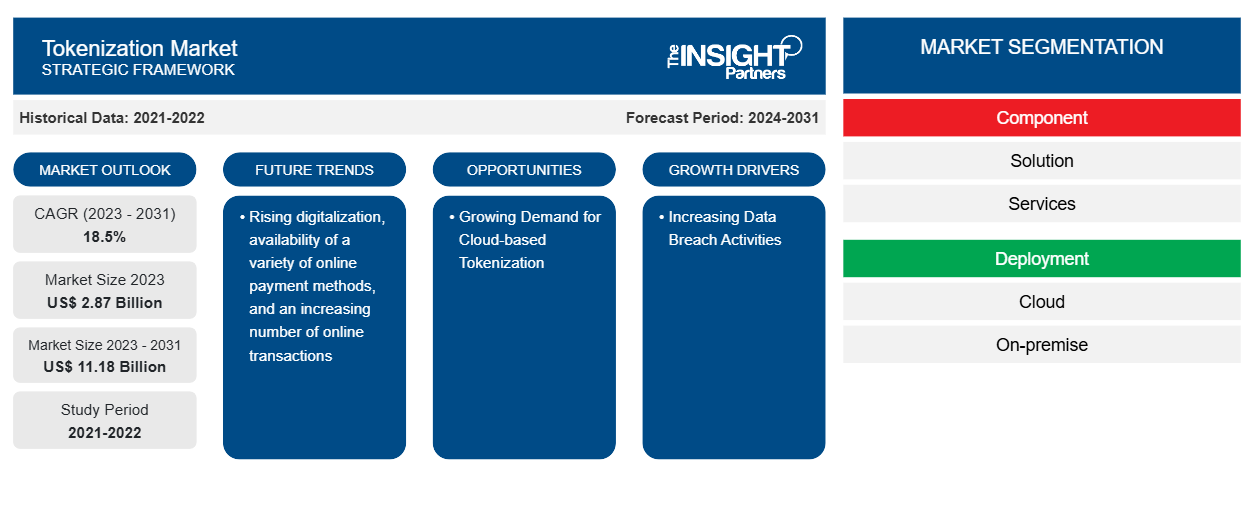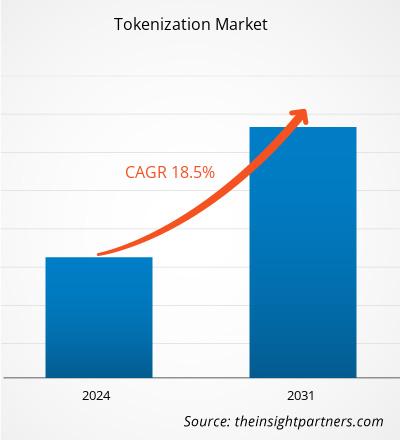Tokenization Market Growth, Analysis, and Forecast by 2031
Tokenization Market Size and Forecast (2021–2031), Global and Regional Share, Trend, and Growth Opportunity Analysis Report Coverage: By Component (Solution and Services), Deployment (Cloud and On-premise), Enterprise Size (SMEs and Large Enterprises), Industry Vertical (BFSI, Retail, IT & Telecom, Healthcare, Government, and Others), and Geography
Historic Data: 2021-2022 | Base Year: 2023 | Forecast Period: 2024-2031- Report Date : Mar 2026
- Report Code : TIPRE00003042
- Category : Technology, Media and Telecommunications
- Status : Data Released
- Available Report Formats :


- No. of Pages : 150
The tokenization market size is projected to reach US$ 11.18 billion by 2031 from US$ 2.87 billion in 2023. The market is expected to register a CAGR of 18.5% in 2023–2031. Rising digitalization, availability of a variety of online payment methods, and an increasing number of online transactions are likely to remain a key tokenization market trend.
Tokenization Market Analysis
The tokenization market is growing at a rapid pace due to the increasing data breach activities and growing data security concerns among consumers across the globe. The market is expanding steadily, driven by the consumer demand for contactless payment. Moreover, the growing demand for cloud-based tokenization and government initiatives for cashless transactions are providing lucrative opportunities for tokenization market growth.
Tokenization Market Overview
Tokenization is the process of exchanging or converting sensitive data for nonsensitive data into smaller parts called “tokens.” It can be used in a database or internal system without bringing it into scope. Tokens have almost no intrinsic value; they are only helpful when they represent something important, such as a credit card primary account number (PAN) or Social Security number (SSN). Most organizations store sensitive data in their systems, whether it's credit card information, medical information, social security numbers, or anything else that has to be secure and protected. Tokenization allows enterprises to continue using this data for commercial purposes without the risk or compliance implications of retaining sensitive data internally.
Customize This Report To Suit Your Requirement
Get FREE CUSTOMIZATIONTokenization Market: Strategic Insights

-
Get Top Key Market Trends of this report.This FREE sample will include data analysis, ranging from market trends to estimates and forecasts.
Tokenization Market Drivers and Opportunities
Increasing Data Breach Activities is Driving the Market
Criminals target businesses that accept debit cards and credit credits. The payment made from these cards contains valuable information that can be stolen. This increases the adoption of tokenization among businesses to protect valuable information. Tokenization helps businesses to protect themselves from any negative financial consequences of data theft. Tokenization not only protects financial information but also supports businesses to protect their personal data from breaches. Moreover, the growing adoption of credit card tokenization among businesses to improve data security for online businesses is driving the market. Tokenization provides data security from the time data is being captured to storage by eliminating the actual storing of credit card numbers in POS machines and internal systems.
Growing Demand for Cloud-based Tokenization – An Opportunity in the Tokenization Market
Cloud-based tokenization is the process of exchanging sensitive data for an irreversible, non-sensitive placeholder known as a token while securely maintaining the original, sensitive data outside of the business's internal systems. Cloud-based tokenization is easier to implement and less expensive than traditional on-premise tokenization. This helps businesses in lowering risk and compliance exposure by removing sensitive data from their data environments. Businesses can also safeguard that data while maintaining utility and the agility of their current business processes by utilizing format- and length-preserving tokens as a placeholder for the original, sensitive data. This is significantly creating opportunities in the market during the forecast period.
Tokenization Market Report Segmentation Analysis
Key segments that contributed to the derivation of the tokenization market analysis are component, deployment, enterprise size, and industry vertical.
- Based on component, the tokenization market is divided into solution and services. The solution segment held a larger market share in 2023.
- In terms of deployment, the market is categorized as cloud and on-premise. The cloud segment held a larger market share in 2023.
- On the basis of enterprise size, the tokenization market is divided into SMEs and large enterprises. The SMEs segment held a larger market share in 2023.
- In terms of industry vertical, the tokenization market is segmented into BFSI, Retail, IT & telecom, healthcare, government, and others. The BFSI segment held a larger market share in 2023.
Tokenization Market Share Analysis by Geography
The geographic scope of the tokenization market report is mainly divided into five regions: North America, Asia Pacific, Europe, Middle East & Africa, and South America/South & Central America.
In terms of revenue, North America accounted for the largest tokenization market share, due to the rapid adoption of new innovative technologies and increasing demand for cloud-based solutions among businesses. Increasing use of online payment methods and growing buy now, pay later with cryptocurrencies is fueling the market. Many financial firms in the US, such as Visa and Mastercard, are providing online transaction services and payment solutions to customers across the globe. This increases the demand for tokenization for protecting data. For instance, in August 2022, Visa issued over 4 billion network tokens globally through Visa Token Service (VTS) to support digital tokens.
Tokenization Market Regional Insights
The regional trends and factors influencing the Tokenization Market throughout the forecast period have been thoroughly explained by the analysts at The Insight Partners. This section also discusses Tokenization Market segments and geography across North America, Europe, Asia Pacific, Middle East and Africa, and South and Central America.
Tokenization Market Report Scope
| Report Attribute | Details |
|---|---|
| Market size in 2023 | US$ 2.87 Billion |
| Market Size by 2031 | US$ 11.18 Billion |
| Global CAGR (2023 - 2031) | 18.5% |
| Historical Data | 2021-2022 |
| Forecast period | 2024-2031 |
| Segments Covered |
By Component
|
| Regions and Countries Covered |
North America
|
| Market leaders and key company profiles |
|
Tokenization Market Players Density: Understanding Its Impact on Business Dynamics
The Tokenization Market is growing rapidly, driven by increasing end-user demand due to factors such as evolving consumer preferences, technological advancements, and greater awareness of the product's benefits. As demand rises, businesses are expanding their offerings, innovating to meet consumer needs, and capitalizing on emerging trends, which further fuels market growth.

- Get the Tokenization Market top key players overview
Tokenization Market News and Recent Developments
The tokenization market is evaluated by gathering qualitative and quantitative data post primary and secondary research, which includes important corporate publications, association data, and databases. The following is a list of developments in the market for tokenization and strategies:
- January 2024: The BIS Innovation Hub announces the first six projects for the 2024 work program, including upcoming projects focusing on safety and security, green finance, and next-generation financial infrastructures, and additional work on advanced data analytics and tokenization is also planned. (Source: BIS, Press Release, 2024)
Tokenization Market Report Coverage and Deliverables
The “Tokenization Market Size and Forecast (2021–2031)” report provides a detailed analysis of the market covering below areas:
- Market size and forecast at global, regional, and country levels for all the key market segments covered under the scope
- Market dynamics such as drivers, restraints, and key opportunities
- Key future trends
- Detailed PEST/Porter’s Five Forces and SWOT analysis
- Global and regional market analysis covering key market trends, major players, regulations, and recent market developments
- Industry landscape and competition analysis covering market concentration, heat map analysis, prominent players, and recent developments
- Detailed company profiles
Frequently Asked Questions
Ankita is a dynamic market research and consulting professional with over 8 years of experience across the technology, media, ICT, and electronics & semiconductor sectors. She has successfully led and delivered 100+ consulting and research assignments for global clients such as Microsoft, Oracle, NEC Corporation, SAP, KPMG, and Expeditors International. Her core competencies include market assessment, data analysis, forecasting, strategy formulation, competitive intelligence, and report writing.
Ankita is adept at handling complete project cycles—from pre-sales proposal design and client discussions to post-sales delivery of actionable insights. She is skilled in managing cross-functional teams, structuring complex research modules, and aligning solutions with client-specific business goals. Her excellent communication, leadership, and presentation abilities have enabled her to consistently deliver value-driven outcomes in fast-paced and evolving market environments.
- Historical Analysis (2 Years), Base Year, Forecast (7 Years) with CAGR
- PEST and SWOT Analysis
- Market Size Value / Volume - Global, Regional, Country
- Industry and Competitive Landscape
- Excel Dataset
Recent Reports
Testimonials
The Insight Partners' SCADA System Market report is comprehensive, with valuable insights on current trends and future forecasts. The team was highly professional, responsive, and supportive throughout. We are very satisfied and highly recommend their services.
RAN KEDEM Partner, Reali Technologies LTDsI requested a report on a very specific software market and the team produced the report in a few days. The information was very relevant and well presented. I then requested some changes and additions to the report. The team was again very responsive and I got the final report in less than a week.
JEAN-HERVE JENN Chairman, Future AnalyticaWe worked with The Insight Partners for an important market study and forecast. They gave us clear insights into opportunities and risks, which helped shape our plans. Their research was easy to use and based on solid data. It helped us make smart, confident decisions. We highly recommend them.
PIYUSH NAGPAL Sr. Vice President, High Beam GlobalThe Insight Partners delivered insightful, well-structured market research with strong domain expertise. Their team was professional and responsive throughout. The user-friendly website made accessing industry reports seamless. We highly recommend them for reliable, high-quality research services
YUKIHIKO ADACHI CEO, Deep Blue, LLC.This is the first time I have purchased a market report from The Insight Partners.While I was unsure at first, I visited their web site and felt more comfortable to take the risk and purchase a market report.I am completely satisfied with the quality of the report and customer service. I had several questions and comments with the initial report, but after a couple of dialogs over email with their analyst I believe I have a report that I can use as input to our strategic planning process.Thank you so much for taking the extra time and making this a positive experience.I will definitely recommend your service to others and you will be my first call when we need further market data.
JOHN SUZUKI President and Chief Executive Officer, Board Director, BK TechnologiesI wish to appreciate your support and the professionalism you displayed in the course of attending to my request for information regarding to infectious disease IVD market in Nigeria. I appreciate your patience, your guidance, and the fact that you were willing to offer a discount, which eventually made it possible for us to close a deal. I look forward to engaging The Insight Partners in the future, all thanks to the impression you have created in me as a result of this first encounter.
DR CHIJIOKE ONYIA MANAGING DIRECTOR, PineCrest Healthcare Ltd.Reason to Buy
- Informed Decision-Making
- Understanding Market Dynamics
- Competitive Analysis
- Identifying Emerging Markets
- Customer Insights
- Market Forecasts
- Risk Mitigation
- Boosting Operational Efficiency
- Strategic Planning
- Investment Justification
- Tracking Industry Innovations
- Aligning with Regulatory Trends




















 Get Free Sample For
Get Free Sample For